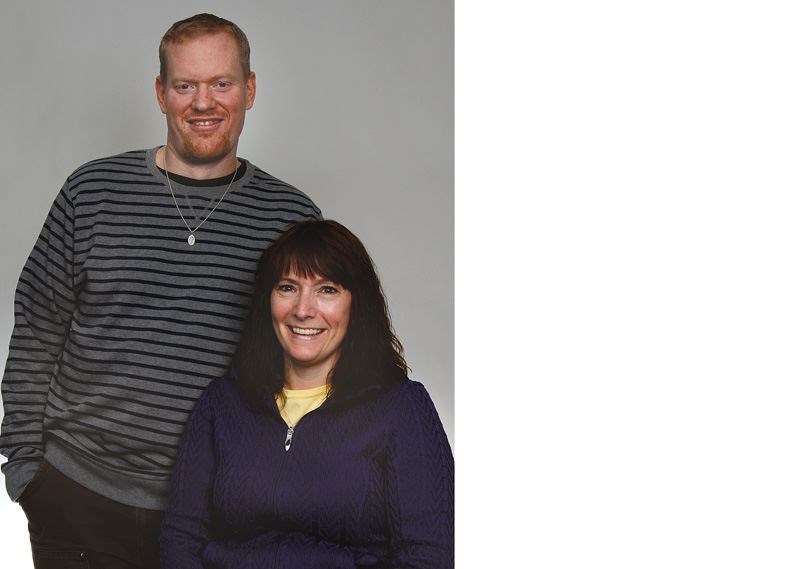She just couldn't stand to see him suffer so Lori Ridley gave her husband, Shane, one of her kidneys.
Lori is the honouree for this year's local Kidney Walk, which will be held Sunday at the Northern Sport Centre.
It all started when Shane, a reliability technician at Canfor, felt a bit under the weather for a few weeks.
"It was getting progressively worse and worse, rather than getting better," said Shane.
After some coaxing from Lori, he finally went to the doctor.
"The day I saw the doctor, it was straight to the emergency room and I was told I had zero kidney function," said Shane. "It was a big shock and with that came the realization that I wasn't going to get better any time soon."
Kidney disease is called the silent killer because typically 80 per cent of kidney function will be depleted before symptoms occur. Each day in Canada, an average of 16 people are told that their kidneys have failed.
The day after Shane was told the terrible news, he started hemodialysis, where a machine filters wastes, salts and fluid from the blood when kidneys are no longer healthy enough to do so. For months, he underwent that treatment, then moved to peritoneal dialysis, which is a treatment for patients with severe chronic kidney disease and that lasted 12 to 14 months, right up until his transplant in March 2013.
"All together is was a year and 10 months of dialysis and then I had the transplant," said Shane.
For Lori, an office manager for a construction company, the decision to give Shane a kidney came after a dark and difficult time in Shane's treatment.
"One night he just had enough and he was really upset," Lori recalls the time in Jan. 2012, after Shane's kidneys failed and he was on extensive dialysis for about eight months.
It all got to be too much, she said.
Shane had been put on a wait list for a cadaver kidney by that time but was told it could be a five-to-10-year wait.
"I just couldn't imagine another seven years of this," said Lori, talking about the hospital visits, the hours of dialysis that interfered with life of their active family with two children and the general ill health of her husband.
The night Shane got so upset, Lori went online after Shane went to bed to see what it would take for her to help her husband.
After extensive research and some luck as the couple found out they matched well as donor and recipient, the date was set.
The operation wasn't as easy for Lori as it was for Shane.
"When they woke me up right after the surgery, I already felt better - but that could've been the wonderful drugs they had given me," joked Shane. "The next morning, laying in bed, I could already tell I was feeling better. Even though I was in incredible pain, I felt better."
Each day kidney function increased for Shane and he felt so good but he knew his wife paid dearly.
"You know I actually talked to the counselor they provided in hospital and he asked me if I had said thank you," said Shane. It was the first day after the surgery and Shane and Lori were in separate rooms and Shane couldn't get to Lori until later on.
"There really are no words, especially when I'm finally seeing her and I'm feeling great - ready to run a marathon and she's having problems, so there's a little bit of guilt there, for sure," said Shane, who will be on anti-rejection drugs for the rest of his life. "There are not many words to say when it comes to something like this, but thank you."
Lori was slow to recover and it took a full six months before she started to really feel like herself again.
"How could I not do this for Shane?" said Lori, with tears in her eyes. "Especially when we found out we were so well suited. We were a perfect match and so you just do it and now we have our family back."
Both Shane and Lori advocate for the local branch of the Kidney Foundation of Canada, where the focus is to raise funds and awareness. The B.C. branch of the foundation has a goal to increase organ donation by 50 per cent over the next five years. Kidney donation is of the utmost importance and the foundation is looking to Close the Gap, a theme for Sunday's Kidney Walk because 85 per cent of B.C. residents say they will donate their organs, only 18 per cent have registered with BC Transplant.
To participate in the walk as a team or individual visit www.princegeorgekidneywalk.ca, to pick up a pledge form call Paul Duperron at 250-962-7958 or just make a donation at the walk.
The Kidney Walk at the Northern Sport Centre on Sunday starts with registration at 1 p.m., opening ceremonies at 1:45 and the walk begins at 2 p.m.



